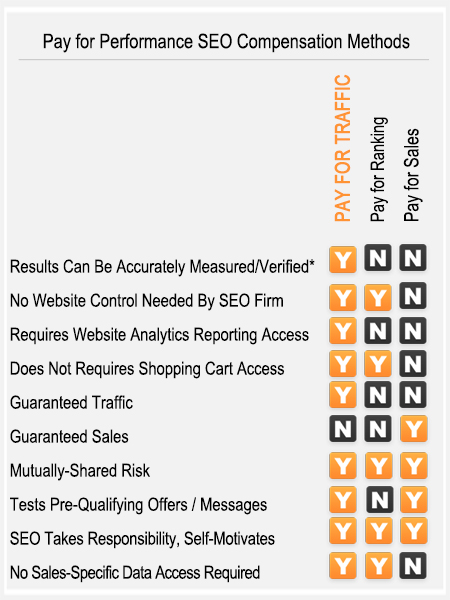What is Pay for Results Search Engine Marketing?

Would You Like Someone To Share Your Search Engine Marketing Risk?
Performance-based marketing is designed to help you grow your business with much lower risk than traditional traffic-generating services. That should mean no more worrying that your search engine marketing fees will produce tangible results. With performance-based pay-for-results systems, the traffic comes to you first, and only then do you pay.
What is Pay Per Results for Search engine marketing?
Pay per results is an internet advertising model used to direct traffic to websites and businesses, where the advertiser pays for an action (such as actual traffic), rather than services such as content creation, pay per click advertising, etc.) So instead of being charged for impressions or clicks and the time/effort it takes to make those things happen, advertisers engaging in pay per response (or pay per action, pay for performance, etc.) are charged only for a qualified response, regardless of how many impressions or clicks their advertisement received. Pay per results search-engine marketing lowers the risk of online marketing not being profitable, since the cost per result/action is agreed upon before the promotional effort is underway.
How our Version of Pay for Results Different?
- Either creating traffic to your site that has a high probability of a sales conversion, or...
- Generating a sales lead for you to close
From our experience, we've found that focusing on these two actions, eliminates most concerns with paying for performance in the search engine marketing world since they are easy to measure, and can be traced directly (and exclusively) to our efforts. To ensure pay-for-performance search engine marketing is truly mutually beneficial (because it can't be sustained if it isn't), the performance criteria have to be clear, useful and, above all, accurately measurable. So, we've focused on consistently and successfully achieving two actions of extreme value with minimal restrictions/conditions.

There are different methods for delivering "pay for performance SEO" including:
- Pay for Ranking (meaning you only pay if you rank say in the top five for a particular term in search engine results)
- Pay for Traffic (where you essentially pay per click, the standard model for paid search)
- Pay for Sales (essentially earning a commission on sales from the website resulting from the efforts of the SEO firm)
There are advantages and disadvantages with each method. For example, while paying only for sales is appealing, it may be difficult to truly segment and attribute the efforts done by the SEO firm in making a particular sale, from the existing activity of the site without the correct implementation and interpretation of advanced analytics. Conversely, paying only for rank can be problematic, mainly because search ranking is now highly personalized, so the same query returns different results for each searcher. As the accompanying comparison chart shows, using a "pay for traffic" performance-based SEO model is a reasonable compromise between performance, accountability and sustained, mutual benefit.
*Because of search-engine personalization, it's hard to determine a final average ranking because factors like user location, search history, social involvement affect rankings that cannot be directly measured.
how we Define results for Search engine SEO:
- An increase in traffic to the website
- For the content we placed on the website (not any content that was there previously or added by another)
- For the mutually agreed upon period of time
